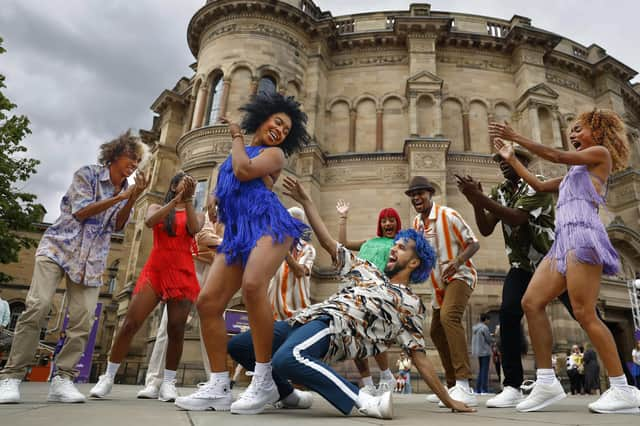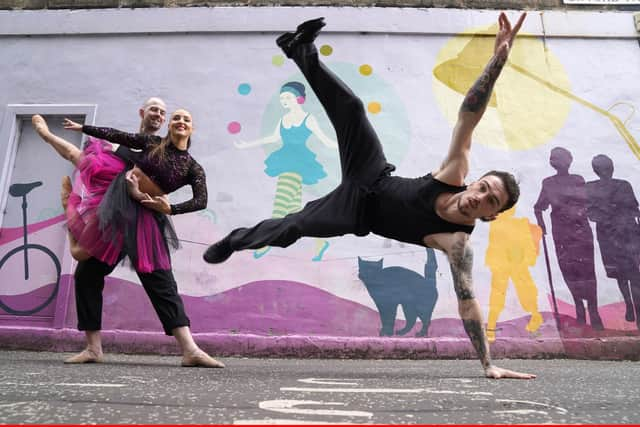Exclusive:Edinburgh’s festivals seek an extra £5m a year to halt long-term funding decline


Edinburgh's major festivals are calling for their public funding to be increased by almost half to secure their long-term future.
The Scottish Government has been told that an extra £5 million a year is needed to stabilise events like the International Festival, the Fringe and the city's celebrations of books, film and visual art and reverse a “decline” in the value of its financial support.
Advertisement
Hide AdAdvertisement
Hide AdUmbrella body Festivals Edinburgh - which works with all of the capital's flagship events – is arguing for five-year funding agreements to be secured to help improve their financial stability, maintain the quality of their programmes and compete with international rivals.


The festivals, which were said to have generated almost £492 million for Edinburgh’s economy last year, want the Scottish Government to expand its definition of a “mega event,” as it does not include events held annually in Scotland.They have drawn comparison with the £36 million committed by the government to the UCI World Cycling Championships, which are currently being staged across Scotland.
Edinburgh’s major festivals receive around £11 milion in public funding each year.
However Festivals Edinburgh claims that this support has lost 44 per cent of its value since 2010 due to the rise in costs over that period.
The views of the city’s major event organisers have emerged in a response to a government consultation on a new national events strategy, which states that “with fierce global competition and limited budgets, it pays to present our country’s image, values and story consistently – domestically and internationally.”
A key ambition of the government is that, by 2035, “Scotland is globally recognised as a world leader in the development and delivery of responsible business, sporting, arts and wider cultural events.”Launching the strategy, the government said that events had “the potential to be one of the most powerful nation branding vehicles we have.”
Festivals Edinburgh's report for the government states: “Edinburgh’s festivals, one of Scotland’s truly global assets, are proudly and fiercely internationalist.
Advertisement
Hide AdAdvertisement
Hide Ad“It was a defining value of their foundations in 1947, which sought to establish Scotland as a cultural hub for global understanding, connecting people and ideas through shared creative experiences, and a commitment to freedom of expression.
"This consistent focus over more than 75 years has grown a global reputation for Scotland as the host of an unparalleled cultural gathering of over 70 countries every August.
"These values align with the Scottish Government’s ambition for the role Scotland can play as a leading global citizen, and provide powerful platforms upon which to build mutually beneficial links with cultural, political and business leaders.
“There is potential to invest further in the cultural diplomacy opportunity offered in August when the eyes of the world are on Scotland.”
Festivals Edinburgh believes the new events strategy “must recognise that core public funding remains essential to business models to take risks on new work, uncover hidden themes, and support participants whose voices would not otherwise be heard.”
Festivals Edinburgh has told the government that putting an additional £5 million a year into the festivals would “restore the decline” since 2010 and help deliver nearly an additional £594 milion in economic benefit over the next five years.
Its submission adds: “The definition of mega events in the consultation is too narrow and should be revised - it is derived from a UK Sport definition for what is termed itinerant events which countries bid to hold on a one-off basis.
Advertisement
Hide AdAdvertisement
Hide Ad"A more meaningful and comprehensive definition should be developed for Scotland’s own national event strategy, given that Scotland has original homegrown mega events in both cultural and sporting arenas.
“WIth a 3.2 million attendances in 2022, even with 75 per cent of the pre-pandemic level of programming, Edinburgh’s festivals remain on a par with a FIFA World Cup and second only to an Olympic Games.
“The crucial difference is that our cultural mega-events are homegrown assets for Scotland that create cumulative annual benefits rather than being staged in a location only once.”
Festivals Edinburgh said it wanted the government to take into account new research it had commissioned which will look at the level of support offered to other “mega events” around the world.
Its report states: "With the stark challenges facing Scottish Government medium-term finances, it is imperative that the strategy must consider the balance of investment between original homegrown events and itinerant one-off events, to prioritise where the best leverage is to be found across a range of economic, reputational, cultural and social impacts.
"Impact analysis already available to the Scottish Government shows that original homegrown events have a higher rate of return, but this does not seem to be reflected in prioritisation decisions.
“Our newly released economic impact study shows a powerful perennial return on investment even after the damage of the pandemic.”
Advertisement
Hide AdAdvertisement
Hide AdThe views of Festivals Edinburgh are echoed in a response to the government from Culture Counts, a country-wide network of arts, heritage and creative industries organisations.
Its own submission states: “Public funding for culture in the UK and Scotland is a third less than the EU average. The events sector is precarious and needs the stability of regular funding.
“Culture Counts, our members and the wider sector have frequently voiced how the pandemic, Brexit and cost of living crisis have exacerbated the ‘perfect storm’ of economic challenges currently facing the sector.
“The sector is already so lean, that if the Scottish Government seeks to make changes to how it supports the event sector at a strategic level, then resources will absolutely be required.
“Support should be maintained for regular events. Multi-year funding is crucial to see long-term impacts and support planning cycles.
“The five-year investment in the UCI World Cycling Championship demonstrates that multi-year commitments can be made despite one-year budgeting cycles.
“With the challenges facing Scottish Government finances, it is imperative that the strategy considers the balance of investment between original homegrown events and itinerant one-off events, to prioritise where the best leverage is to be found across a range of economic, reputational, cultural and social impacts.”
Comments
Want to join the conversation? Please or to comment on this article.
